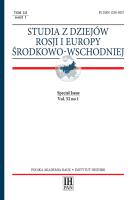On the Polish National and Territorial Autonomy in Lithuania (the Spring–Summer of 1991)
On the Polish National and Territorial Autonomy in Lithuania (the Spring–Summer of 1991)
Author(s): Vladas SirutavičiusSubject(s): Cultural history, Economic history, Local History / Microhistory, Political history, Transformation Period (1990 - 2010)
Published by: Instytut Historii im. Tadeusza Manteuffla Polskiej Akademii Nauk
Keywords: Republic of Lithuania;national minorities;ethnic conflicts; national-territorial autonomy
Summary/Abstract: A new system of Polish-Lithuanian relations was shaped manly by the passivity of Poles inhabiting the eastern Lithuania in the plebiscite organised by the Lithuanian government on 9 February 1991, and a decision of the authorities of Vilnius and Šalčininkai (Polish: Sołeczniki) regions to hold a referendum, initiated by Mikhail Gorbachev, on the future of the Soviet Union to turn it into a new, loose confederation of states, which was not recognized by the Lithuanian authorities. Such an attitude of Lithuanian Poles was determined by several factors. Firstly, the Soviet social and economic structure; secondly, for a large part of people the old governments of the Vilnius and Šalčininkai districts and the memory of the Lithuanian Soviet Socialist Republic guaranteed stability and predictability. The soviet structures were more trusted than a newly introduced, not strong yet Lithuanian social and political order. The sense of threat was intensified by an unquestionable domination of Lithuanians on all levels of the new hierarchy. Social and political reforms were perceived by the Polish minority in Lithuania through the prism of a rule of the majority. For the rest of the Lithuanian society (except of the Russian minority) such an attitude was completely incomprehensible. In such complex geopolitical circumstances Poles from the regions of Vilnius and Šalčininkai decided to convene a congress of deputies of the Vilnius and Šalčininkai regions to Mostiškės. According to a project adopted at the Congress, the Vilnius district was to become “an autonomous administrative-territorial unit within the Lithuanian Republic”, with a broad political autonomy. In the opinion of Lithuanians, however, the region of Vilnius should not be “an autonomous administrative-territorial unit of the Lithuanian State”, but form a part of Lithuanian federation. This meant that the Poles wanted to enlarge the status of the Vilnius region and to strengthen its autonomy within Lithuania. The implementation of such a project would mean a decentralisation of the state. In a complex geopolitical situation of that time all attempts at the decentralisation of the country was regarded by the Lithuanian political elite as the threat of the security of the young Lithuanian state, its sovereignty and territorial integrity.
Journal: Studia z Dziejów Rosji i Europy Środkowo-Wschodniej
- Issue Year: 52/2017
- Issue No: 1
- Page Range: 163-195
- Page Count: 33
- Language: English

